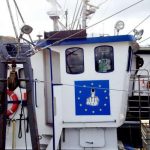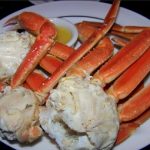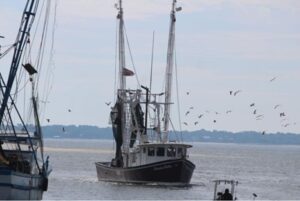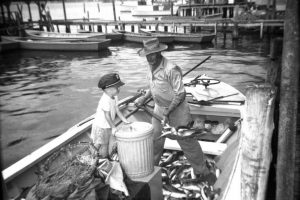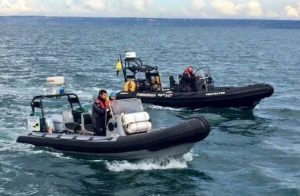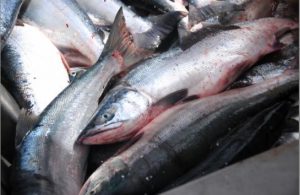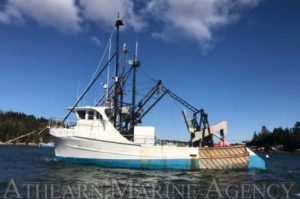Tag Archives: Maine lobster industry
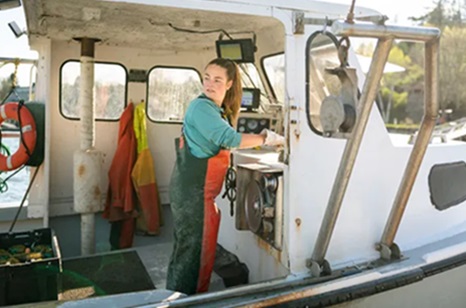
Maine lobster fisherman reveals why the crustaceans she catches taste ‘sweeter, ‘better’
The daughter of a lobster fisherman from Maine describes herself as being “born into it.” Sadie Samuels left the Pine Tree State and headed to college across the country in California, but she kept fishing during the summers to pay for her tuition. After graduation in 2013, she began fishing full-time and has never looked back. Samuels, 32, opened her restaurant, Must Be Nice Lobster – which has the same name as her boat, F/V Must Be Nice – in a permanent indoor location in 2022. “My dad kind of kicked me off his boat because you can only fish 800 traps on a boat,” she said. “So, the more I wanted to fish, the less he could fish if I still fished on his boat.” “[My father] finally was like, ‘All right, obviously you’re interested in this. Go buy a boat,'” she recalled. “So that’s pretty much how that happened.” Photos, Video, more, >>CLICK TO READ<< 12:17
A whale washed up dead. Greens blame a Democrat.
 Environmentalists say Chellie Pingree’s defense of the Maine lobster industry could imperil a critically endangered whale. Doing what greens want would likely send the Democrat to political extinction. Conservation advocates are publicly pressuring Pingree to overturn a law that protects Maine’s prized lobster fishery. The calls come after one of only 360 remaining North Atlantic right whales washed up dead in February entangled in Maine lobstering rope. “I think it is a little bit more of a black mark on an otherwise fairly good conservation record,” said Brett Hartl, the government affairs director at the Center for Biological Diversity, on Pingree’s support of the pro-lobstering law. It’s a rare rebuke of a longtime ally who has a near-pristine voting record on environmental issues. Pingree says she has no plans to reverse course, but the incident highlights how lawmakers continue to balance environmental concerns with the everyday lives of their constituents. more, >>CLICK TO READ<< 17:57
Environmentalists say Chellie Pingree’s defense of the Maine lobster industry could imperil a critically endangered whale. Doing what greens want would likely send the Democrat to political extinction. Conservation advocates are publicly pressuring Pingree to overturn a law that protects Maine’s prized lobster fishery. The calls come after one of only 360 remaining North Atlantic right whales washed up dead in February entangled in Maine lobstering rope. “I think it is a little bit more of a black mark on an otherwise fairly good conservation record,” said Brett Hartl, the government affairs director at the Center for Biological Diversity, on Pingree’s support of the pro-lobstering law. It’s a rare rebuke of a longtime ally who has a near-pristine voting record on environmental issues. Pingree says she has no plans to reverse course, but the incident highlights how lawmakers continue to balance environmental concerns with the everyday lives of their constituents. more, >>CLICK TO READ<< 17:57
Maine Lobster Industry Faces off against Conservationists over Whale Protections
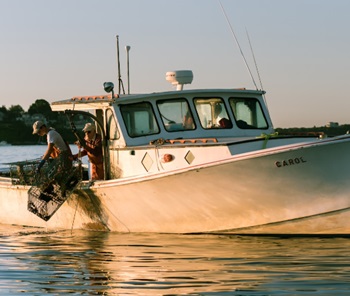 Maine lobster fishers recently won reprieve on new federal regulations to protect the endangered North Atlantic right whales. According to the Maine’s Lobstermen Association, The regulations could dramatically change lobster fishing practices, impacting fishers and Maine’s island communities who depend upon this resource. In 2023, a federal court ruled in favor of the Center and other groups, finding that NOAA had violated the Endangered Species Act and Marine Mammal Protection Act, and was not doing enough to reduce the lobster industry’s threat to right whales. But Maine’s community of lobster fishers are encouraged by the decision. “It gives us time to take a breath,” Steve Train, a commercial lobster fisher from Long Island, Maine, tells Food Tank. “Some people think it might be the end of it all, but I think most people see a little light now that we can work under.” “In the last 25 years, there has been one documented entanglement of a North Atlantic right whale in Maine fishing gear,” Train says. more, >>click to read<< 13:16
Maine lobster fishers recently won reprieve on new federal regulations to protect the endangered North Atlantic right whales. According to the Maine’s Lobstermen Association, The regulations could dramatically change lobster fishing practices, impacting fishers and Maine’s island communities who depend upon this resource. In 2023, a federal court ruled in favor of the Center and other groups, finding that NOAA had violated the Endangered Species Act and Marine Mammal Protection Act, and was not doing enough to reduce the lobster industry’s threat to right whales. But Maine’s community of lobster fishers are encouraged by the decision. “It gives us time to take a breath,” Steve Train, a commercial lobster fisher from Long Island, Maine, tells Food Tank. “Some people think it might be the end of it all, but I think most people see a little light now that we can work under.” “In the last 25 years, there has been one documented entanglement of a North Atlantic right whale in Maine fishing gear,” Train says. more, >>click to read<< 13:16
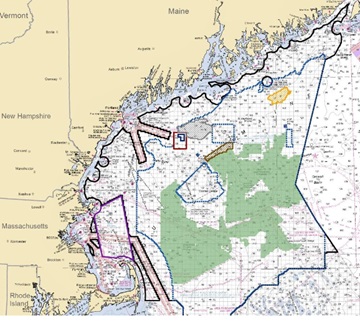
Maine Lobstermen Win Giant Carveout From Offshore Wind Development Area
The U.S. Bureau of Ocean Energy Management (BOEM) is rolling out designated offshore wind leasing areas off the lower 48 states at a rapid clip, racing to meet the Biden administration’s target of 30 gigawatts of capacity by 2030. For the latest – a 3.5 million acre parcel in the Gulf of Maine – it has decided to dodge a looming fight with fishing and environmental interests. The newly-released Draft Wind Energy Area for the Gulf of Maine has enough room for up to 40 gigawatts of offshore wind capacity, with a focus on floating wind installations in deeper water. The size is notable, but the most conspicuous part is the part that was left out: Lobster Management Area 1, a strip along the coast that is essential to the powerful Maine lobster industry. >>click to read<< 09:08
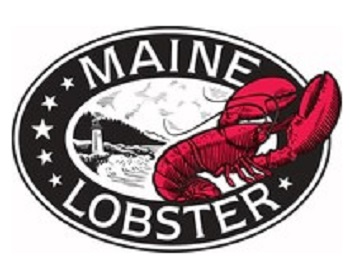
The Maine Lobster Industry Debuts First-Ever “Celebrate the Maine Lobster Roll,” an Impactful Twist on This Iconic Summer Dish
Lobster lovers, listen up. This summer, the Maine Lobster Marketing Collaborative (MLMC) is partnering with local restaurants and nationwide distributors to debut a new special: the “Celebrate the Maine Lobster Roll.” The “Maine Characters” campaign will spotlight the broad impact the fishery has on the state of Maine and will feature the stories of the individuals behind the industry – from the fishermen to the processors, dealers, trap builders, restaurants owners and more. The “Celebrate the Maine Lobster Roll” will give diners a taste of the impact with custom materials including toothpicks, placemats, sandwich paper and postcards that feature these individuals, along with a QR code to the “Maine Characters” digital hub to learn more. The best part? Every roll sold will help support the fishery. >click to read< 08:29
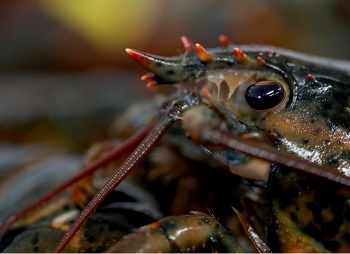
After court victory, Maine lobster industry expects status quo for a few more years
The Maine lobster industry scored a major victory last month, when a federal appeals court ruled that the scientific assumptions used to regulate fishing and protect endangered North Atlantic right whales went too far. That means the status quo for Maine fishermen should remain for several more years. “The gear markings, weak links and other steps the fishery has taken in attempt to reduce entanglement risks will stay in place for the foreseeable future,” says Patrice McCarron of the Maine Lobstermen’s Association. >click to read< 09:35
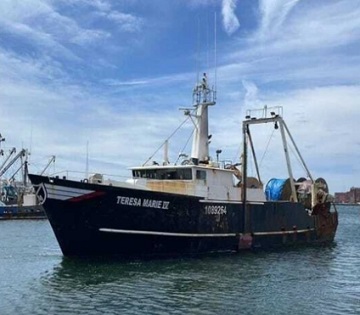
Environmental Regulations and Wind Turbines Are Backing New England Fishermen into a Corner
Just three weeks ago, Jerry Leeman was a commercial fishing captain in New England and a very successful one at that. Now, as executive director of the newly formed New England Fishermen Stewardship Association, he’s leading the charge against Biden administration policies that threaten the industry he loves, including overregulation and wind-turbine development in the Gulf of Maine. Leeman said that he and fellow New England fishermen have serious concerns about the accuracy of the NOAA data. Fish-population assessments fell to the wayside during the Covid years — 2021 and 2022 — and the data-collection process has not yet been corrected. “Whether you’re a lobsterman or a ground fisherman, a trend up and down the coast here is that nobody wants wind turbines placed in our environment. It’s going to mess up our stocks and our species. Not to mention it’s going to change the viability for generations to come in the fishing grounds,” Leeman said. Photos, >click to read< 07:51
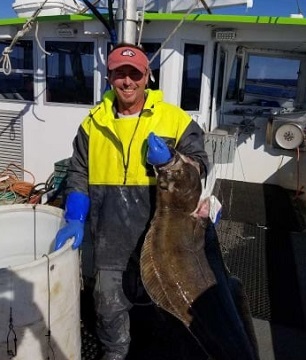
‘Enough is enough’: Midcoast lobsterman decries regulations to protect whales
Jason Lord, a second-generation Midcoast said he understands the effort to save critically endangered North Atlantic right whales. The problem, he contends, is lawmakers, government agencies and conservation groups have it wrong by targeting the Maine lobster industry, which has been forced to use breakaway trap lines and observe a seasonal no-fishing zone to protect the whales. “I’ve never seen a right whale off the coast of Maine,” said Lord, 50, who has been in the industry for 30 years. An Arizona congressman recently proposed a bill that could lead to further regulations like ropeless lobster traps. Last week, Maine Lobstering Union Local 207 Executive Liaison and Political Director Virginia Olsen testified against the bill on Capitol Hill. >click to read< 18:23
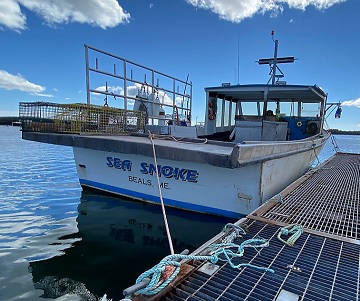
Maine lobster industry must accept that ‘big changes are coming’ despite delay in federal rules, commissioner says
“The work now is critical,” DMR Commissioner Patrick Keliher told the Lobster Advisory Council Wednesday. “The buy-in is critical. The data we’re going to be collecting over the next four years is critical. We can’t have infighting. We have to accept big changes are coming. ”Those changes could include additional regulations to make ropes weaker, a move toward ropeless lobster traps and additional restrictions on fishing grounds. Between now and then, the industry needs to report its harvest to federal officials, participate in a vessel tracking program and find ways to help monitor where endangered whales are migrating, Keliher said. >click to read< 08:49

Green Groups Ignore Genuine Risks To Whales From Offshore Wind Farms
Environmentalists want to crack down on the Maine lobster industry in the name of protecting endangered whales, but they turn a blind eye to the greater threat to whales from proposed offshore wind farms. The irony is almost as delicious as the lobster dinners at stake. Green groups such as the Center for Biological Diversity and Defenders of Wildlife routinely target commercial fishing by claiming that it causes ancillary harm to marine species protected under the Endangered Species Act and other federal laws. This includes the North Atlantic right whale, whose population of only 350 or so migrates up and down the Atlantic Coast and can cross prime lobster territory off New England. >click to read< 11:52

Walton: Maine lobsters — a coast to coast dispute
Some years back I wrote about my distaste for seafood. If it swims in our oceans or lakes, I don’t eat it. To my surprise, many readers acknowledged they feel the same. So perhaps they are as shocked as I am that I rise to the defense of the Maine lobster industry, which finds itself on a prominent and respected environmental “watch” list, threatening thousands of jobs up and down the Maine coast. Why should a guy who prefers a good burger care? >click to read< 08:19
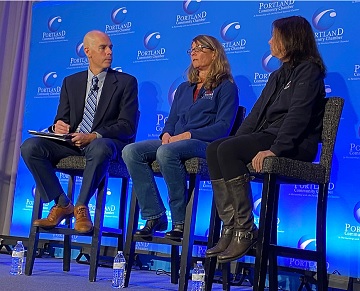
Lobster industry leaders vow to continue fight to protect Maine’s iconic fishery
Maine lobster industry officials told business leaders Thursday that they will continue to fight what they see as unfair and unnecessary federal rules meant to protect endangered right whales. “We are well over a $2 billion industry to the state primarily operating in communities without other job prospects,” Patrice McCarron, head of the Maine Lobstermen’s Association said. “It cannot be overstated.” Lobsterman Curt Brown, who is also a marine biologist, said the industry has been taking steps to protect the whales since the 1990s, including replacing floating ropes, using weak links so ropes break more easily and removing 30,000 miles of rope from the Gulf of Maine. >click to read< 07:34
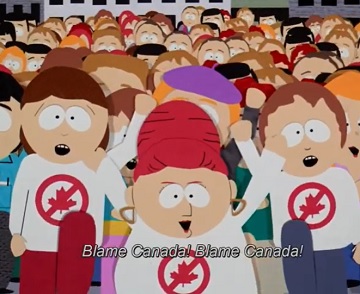
Canada is doing its part to protect right whales
Since 2017, the Canadian lobster industry feels like it’s been trapped in a “South Park” episode. There has been a steady drumbeat eager to “Blame Canada” for the plight of North Atlantic right whales. Right whales were rarely observed in the Gulf of St. Lawrence until recently. All that changed in 2017 when a large number unexpectedly moved to the Gulf. Tragically, we lost 17 right whales: 12 in Canadian waters and five in the United States. Two of the 12 Canadian fatalities were found to be caused by crab gear entanglements. Our Maine peers have made huge strides and sacrifices in recent years to protect right whales. Canada has also been leading the way, with the most aggressive management measures in the world. >click to read< By Geoff Irvine and Nat Richard 15:55

This National Lobster Day, Sept. 25th, Help Support the Maine Lobster Industry
The Maine Lobster fishery is one of the most sustainable fisheries in the world, thanks to the hard work by generations of lobstermen to protect both the lobster resource as well as Maine marine environment for more than 150 years. This includes decades of proactive changes to protect endangered right whales, including weakening lines, removing thousands of miles of rope from the water, and converting all ‘floating’ rope to safer ‘sinking’ rope. Yet, this month, the Monterey Bay Aquarium’s Seafood Watch program placed Maine Lobster on its “Red List” of seafoods to avoid, citing protection of right whales, ignoring decades of good faith conservation management and despite a lack of evidence of Maine Lobster fishery’s impact on the species. In fact, zero right whale deaths or serious injuries have ever been attributed to the Maine Lobster fishery. Here’s what you can do to do support the independent, hardworking fishermen of Maine: >click to read< 12:00
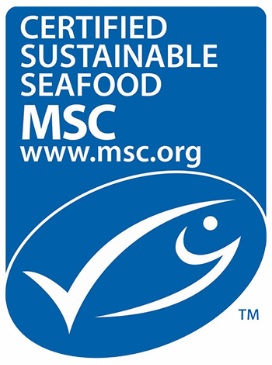
Enviros challenge Maine lobster fishery’s sustainability certification
The Natural Resources Defense Council and other conservation groups are challenging a seafood watchdog’s recertification of the Gulf of Maine lobster fishery as a sustainable resource. The Gulf of Maine’s lobster fishery first received the Maine Stewardship Council’s sustainability certification in 2013, and since then participating lobster businesses have been able to display the council’s blue fish checkmark recognized by eco-minded consumers. Virginia Olsen of the Maine Lobstering Union calls the resource defense council’s effort unfortunate. “Maine fishermen have stepped up to implement whale rules time and time again,”>click to read< 15:21

Maine lobster industry may receive nearly $14 million in federal aid
U.S. Reps. Jared Golden and Chellie Pingree, both Democrats from Maine, helped secure the funding and pledged to keep advocating for the fishery. In a statement, Golden called the regulations misguided, indefensible and economically damaging. “NOAA has been unable to prove that these regulations will work, but lobstermen are still being forced to pick up the tab,” he said. “It’s just wrong.” Virginia Olsen, director of the Maine Lobstering Union, said the money will help keep fishermen in business as they “work to right the wrongs” of the new regulations. Patrice McCarron, executive director of the Maine Lobstermen’s Association, agreed. >click to read< 19:58

Who’s really in the trap? How new right whale regs are hurting Maine’s lobster industry
I was five years old, opening my family’s refrigerator door in search of a juice box, when a live lobster fell out and started thrashing around on the floor. Naturally, I immediately screamed and ran out of the kitchen at the sight of this crustacean monster. That was the first time I really put the pieces together of what my father did for a living. As a local Maine lobsterman, he would often bring home portions of his catch while I was growing up. I’m not sure if that would be the case now if he were still in the industry. Even in the short span of my lifetime, the Maine fishing industry has faced new challenges as the world changes around us. >click to read < By Hajna Nagy15:43

Need for legal defense fund spotlights failures of federal lobster management
The Legislature’s recent passage of LD 1916, An Act to Create a Legal Defense Fund for the Maine Lobster Industry, shows a clear move by the state to protect its lobstermen from assumed federal government oversight. LD 1916, sponsored by Rep. Billy Bob Faulkingham, R-Winter Harbor, allocates money from an existing lobster license surcharge to help fund the legal battle against these tough regulations in the courtroom. Lobstermen have argued that the regulations aimed at protecting right whales are unfounded and not science-based. Some have argued that a right whale has not been found in the waters that have been closed off by NOAA since 2010. >click to read< 10:46

Rebuttal: Ropeless lobstering is not the answer
I grew up in a lobster fishing family and I think I know a thing or two about how to live, thrive, and survive on the water. So, I was surprised to read a recent column, (“Ropeless Technology Ahead of the Wave,” March 2) authored by a “wild mushroom entrepreneur” who seems to think she actually knows best when it comes to the future of the lobster industry. It is accurate to say the Maine lobster industry faces an uncertain future, but not because of the endangered North Atlantic right whale. The real threat comes from Washington, DC,,, >click to read< By John Leonard 09:51
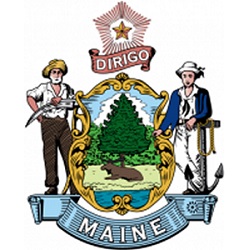
Maine Granted Intervenor Status in Lawsuit Challenging Federal Regulations
Governor Janet Mills announced today that the Maine Department of Marine Resources (DMR) has been granted intervenor status in Maine Lobstermen’s Association v National Marine Fisheries Service, a lawsuit before the U.S. District Court in Washington, D.C. that challenges Federal regulations hurting Maine’s vital lobster industry. It is the Mills Administration’s latest effort to stand up for the lobster industry and its hard working men and women in the face of the Federal government’s burdensome proposal. >click to read< 09:26
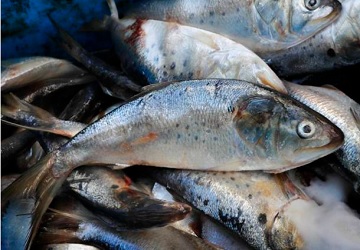
Surge in baitfish catch is a boon to Maine’s lobstermen
Maine’s lobster fishermen typically bait their traps with dead herring, but a scientific assessment in 2020 found that herring are overfished, and quotas for the fish were reduced dramatically. The loss of herring has increased the price of bait and made it harder for many fishermen to trap lobsters. However, losing herring has been offset somewhat by swelling catches of menhaden. Maine’s catch of menhaden, also called pogies or bunker, grew from about 6 million pounds in 2016 to more than 24 million pounds last year. >click to read< 11:28
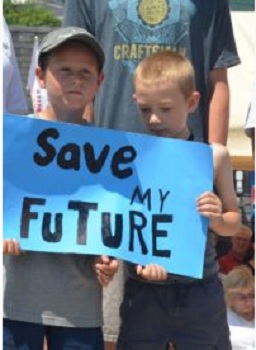
Challenges abound, but lobstermen say they’re in it for the long haul
Around 2 a.m. each morning, a parade of trucks from around the region begins the journey down to the Stonington docks, marking the start of another day of lobstering in Maine. In short, a large part of coastal Hancock County and beyond depend on lobster. One of the locals that has made her living off lobster is Julie Eaton, a member of Stonington’s 300-plus lobster boat fleet. She’s been at it for 39 years now and to her it’s not just a job, it’s a way of life. Every fisherman has their own story, but almost all of them say they got into the business because they love working on the ocean. 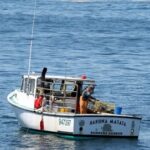 For the hundreds of lobstermen in the region, things are going pretty well at the moment, even with the pandemic. While things are going well, if you talk to almost any Downeast lobstermen about the future of their industry, the conversation will come to two things: right whales and wind turbines. >click to read< 13:28
For the hundreds of lobstermen in the region, things are going pretty well at the moment, even with the pandemic. While things are going well, if you talk to almost any Downeast lobstermen about the future of their industry, the conversation will come to two things: right whales and wind turbines. >click to read< 13:28
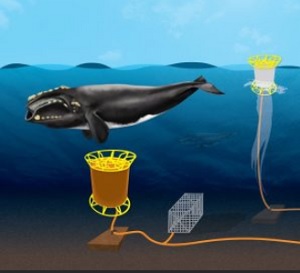
Fed Right whale plan could mean lobster industry changes – a reinvention of the fishery as we know it
Federal officials recently released plans,,, But it’s the risk reduction target, an aggressive 98 percent, that Maine Department of Marine Resources officials said means only one thing, “a complete reinvention of the fishery as we know it.” The conservation framework, an addition to the 582-page biological opinion, creates a four-phased approach to all but eliminate the death and serious injury of the whales in federally managed fishing grounds. The first phase calls for a 60 percent reduction in right whale deaths and serious injuries this year. Patrice McCarron, Maine Lobstermen’s Association, fears the industry can’t sustain that level of change. “If you look at the changes we’ve made over the last 25 years, there’s not a lot left to give,”, >click to read< 10:27
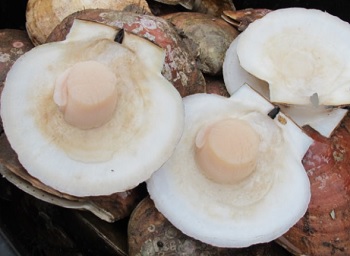
Despite unprecedented 2020 market losses, Maine fishermen brought in history’s 9th most valuable catch
Valued at $516.8 million, the ex-vessel value, or price paid at the dock, of Maine’s commercially harvested marine species was the ninth-highest on record. Maine’s lobster fishery once again accounted for most of the state’s overall landed value, with the lobster catch totaling $405.98 million. While the landed value was down from $491.2 million in 2019 and the 2016 peak of $540.7 million, it was the seventh straight year that the lobster fishery exceeded $400 million. Maine scallop fishermen brought ashore an additional 224,874 pounds compared to 2019, ranking the fishery as the third-most valuable, despite a 19-cent per pound decrease in value. >click to read< 09:12
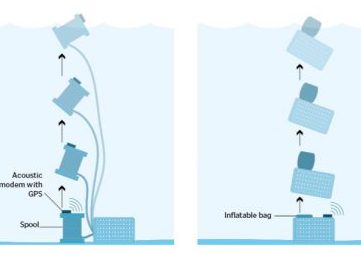
Enviros and lobster fishermen are unhappy with proposed federal regulations to protect right whales
In a public hearing Tuesday night, conservationists and fishermen alike roundly criticized federal regulators’ proposed changes in fishing rules to protect endangered whales from fishing gear. Much of the discussion focused on so-called ropeless lobster fishing technology, which allows traps to be located and retrieved using remote-control systems. Conservationists see that as the ultimate solution, But many Maine fishermen scoff at the idea, and Marine Resources Commissioner Patrick Keliher agreed it’s not practical for Maine’s diverse fishing grounds. >click to read< 15:33
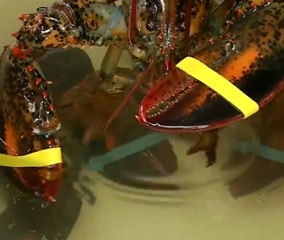
Maine lobster industry salvaged its summer despite pandemic
The Maine lobster industry is in the midst of a multiyear boom, and fishermen have caught more than 100 million pounds (45,360,000 kilograms) for a record nine years in a row. It’s hard to guess whether they’ll reach that total again, but summer 2020 hasn’t been half bad for a season in which many fishermen expected collapse, said Kristan Porter, president of the Maine Lobstermen’s Association. “Especially early in the season when nothing was open, no restaurants were open. We were thinking it would be a complete disaster,” Porter said. “If it stays like this, we can struggle through and have a season, and then get ready to fish next year.”>click to read< 17:03
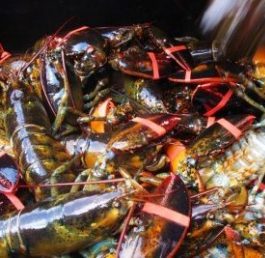
Maine: 1 in 3 Lobstermen got small Paycheck Protection Program loans
About $14.9 million in forgivable Paycheck Protection Program, or PPP, loans of less than $150,000 have been handed out to 1,358 Maine lobstermen, according to an analysis of newly released U.S. Small Business Administration data. That puts lobstermen ahead of full-service restaurants, real estate offices, beauty salons and home builders, which rounded out the top five Maine industries receiving small PPP loans. Maine’s $1.4 billion-a-year lobster industry – including those who buy, sell and process lobster as well as catch it – have received 1,495 forgivable PPP loans worth at least $24.2 million, so far. Fishermen got the lion’s share of the industry’s total PPP money, but only because they outnumber dealers, retailers and processors. Some dealers got loans of up to $1 million. >click to read< 07:15
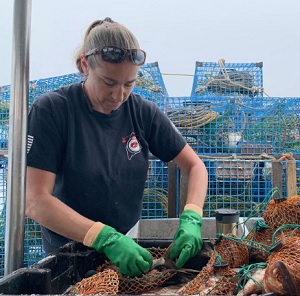
In Lobster Town U.S.A., When the industry suffers, the pain ripples.
Blaine Olsen, a lifelong lobsterman, was navigating his 30-foot boat off the coast of Stonington, Maine, when his sternman, who’s also his wife, yelled above the diesel engine’s din about the pittance the local cooperative was paying harvesters. He shot Ginny a doleful stare for a good five seconds. “Holy sh-t, man,” he said. “It costs us $600 a day to go out.” The dock price, $2.25 a pound for soft-shell lobsters, was half what it was a year ago, making it virtually impossible to earn a profit. The novel coronavirus has barely touched the public health of this corner of rural down east Maine, with Hancock County reporting just 16 cases and one death as of June 30. Its economic health is another matter,,, >click to read< 10:50
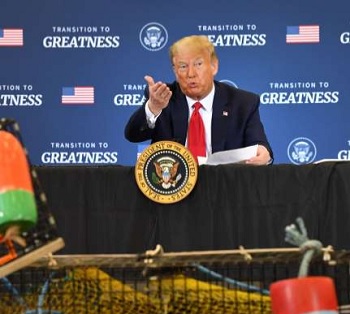
‘Out of the blue,’ Trump directs trade offset aid to Maine lobster industry
President Donald Trump directed his administration on Wednesday to provide lobster fishermen with financial assistance to make up for lost income from Chinese tariffs in a move that one of Maine’s senators praised and said “came out of the blue.” White House trade adviser Peter Navarro said Trump signed a memorandum Wednesday calling on the agency to make available to the lobster industry subsidies like those given to soybean and other agricultural growers. Maine accounts for 80 percent of the U.S. lobster haul The state’s congressional delegation lobbied for such a move in a June 2019 letter. >click to read< 21:23



































